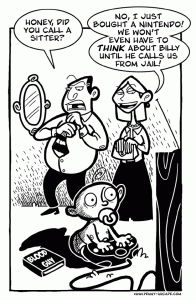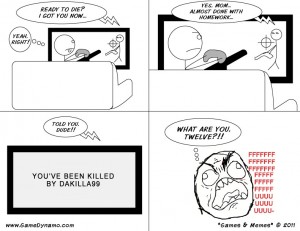Home Daycare
by PixelCub, HSM guest contributor
Age is, and will likely continue to be, a hot-button issue for Home users for as long as Home exists.
Is this issue limited to Home though? If only. Home itself, however, is not rated in the same sense, as it is an online social hub and not a game itself. There is no E for everyone, T for teen or MA for mature. It has games based on games rated by ESRB and a general rating based on games E10 and up. Yet at the same time, Home displays content in both the Community Theater and on the EOD service which can be considerably stronger in its nature.
Can you be too young or too old for Home? SCEA Home sub-accounts are limited to thirteen years of age, but is that too young? In fact, what is too young, what is too old? Nothing has frustrated me more than playing Call of Duty, or Assassin’s Creed or some other excessively violent game and hearing a taunt from some eight-year-old.
I frankly have to wonder to myself where these kids’ parents are.
I do not feel someone can be too old, but there is an expectation that a person can conduct themselves accordingly — not necessarily act their age, but conduct themselves appropriately in public, and Home is a public space. It may be in a virtual world, in an ethereal existence, but it is publicly accessible; your avatar is a representation of yourself. The virtual world does not exempt one from acceptable conduct.

Spot the child in this picture. Now spot the child molester.
Home is not excessively violent, but should a five-year-old walk around, aimlessly unsupervised in this virtual world? Were it just the environment itself, I wouldn’t see a problem. Yet in Home there is the inevitable interaction with other people — real people behind the avatar that may not have a child’s best interests in mind. Sony provides a means for reporting lewd and unacceptable behavior, yes, but they cannot provide babysitters for a child. It is up to parents to be parents, and as irresponsible as it is to allow a child to browse the internet or enter chat rooms, or have a Facebook page without supervision, it is also irresponsible to allow a child to interact in Home with anyone unsupervised.
Were it just the minor inconvenience of an immature child misbehaving and acting out in Home while I am on Home it would be one thing, but recently while waiting for a game to load I was chatting with someone. Within minutes I knew the kid’s name, the kid’s age, and what city he lived in. Does a child really possess the caution to not share personal information with strangers online? Does a child see Home as being online, or as a harmless video game? It is frightening to me really that many parents still see video games as a kid’s plaything, ignoring all responsibility as a parent, and ignoring the rating on the packaging.
Not long ago there was a report of a 46 year old man strangling a 13 year old boy over a Call of Duty feud. You have to really take a minute to analyze this incident. The man was unemployed, playing a session online, and constantly being taunted by this teenager; it gets to him, and in a moment of frustration that lasts long enough for the man to make it over to the boy’s house and assault him by strangling him. So many questions swim in my head that it begins to spin. I understand the frustration of losing in a game and being subjected to taunts, but it is part of the gaming experience in competitive gaming. I understand the frustration of unemployment, but reason usually wins over. The boy’s mother knew the man, and rather than confront him, she involves the police. Wise decision, but what I have to wonder is that she allows her underage son to play a game that is rated MA-17 in the US and 18 in UK, where the incident occurred.
Objectively, the only innocent in this situation is the thirteen-year-old. What is his crime? Getting excited and taunting another player in the heat of adversarial competition? He is a teenager, so of course he was doing what comes natural to him at an age of fluctuating hormones and immaturity. I can’t, however, absolve a mother who would purchase and condone her child playing an excessively violent game where he can interact with strangers including emotionally unstable people.

Unfortunately, that is the real issue with technology and what it allows. The World Wide Web shrinks the world and expands our options of communications or contact. That has tremendous virtues and great risks, especially for children. Those are risks that parents may be blithely unaware of, but predators aren’t.
Should game developers take more action to ensure the very young are safer in games? I have to step back and really think about that question, but I can’t agree with the notion of Sony or game companies being legally responsible. They are a business, and their concerns are too tied up with providing quality product that competes for our money. It isn’t up to the corporations or the government to babysit or provide child care for neglectful parents.
So what rating should Home have? That is another tough question to answer. Home cannot risk alienating any of its users, by promoting one age or another, one group over another. Chances are, any rating would go greatly ignored anyway. I was a kid once, and I was very good at getting away with breaking a lot of rules. I do feel that based on the content and the level of interaction of a social hub, it should have a Teen rating. Even then a rating that specifies something as being acceptable for teens doesn’t mean someone under the legal age of adulthood should go on without parental supervision. Frankly, allowing sub-accounts at thirteen years of age to populate Home just seems too young.
Does this mean constant monitoring by parents? No, not necessarily — just some awareness and involvement on the part of parents. There are too many resources available on the content of the game for parents to not make informed decisions about what they allow their children to be exposed to. And that includes Home.



I agree totally PixelCub. I wrote something about this subject myself as well. Many parents don’t even realize that there are parental controls in the PS3 they can use to keep their kids safer. They need to create a sub account to set them up for their kids, but they do help. A sub account under 18 is not allowed in the theater by the way, at least that is what I have heard happened to many people.
This type of information needs to be reiterated over and over so that parents become aware that there are dangers, even in Home.
Great job on the article.
This really is an important topic! Adults should care whether children are in here trying to emulate adults.
Great article PixelCub!
Right on the money! This has been an issue since the beginning of the internet. I doubt it will go away soon, but it is nice to know there are other concerned adults out there wondering who is supervising all these kids besides a keyboard, gaming console, and the dog.
This is a great article and a question that I have asked myself many times being a parent myself. My son has a sub-account but it would be very easy to get around that an the rated content in Home. I have seen things that have made me question if 13 is way too young for Home. Some parents may not know much about what Home is or that it needs supervision for minors. Unfortunately, some parents do use game consoles as babysitters and I have been surprised in stores where parents will buy MA games for obviously very young children. Home is not like a game where you may just get exposed to things that are not age appropriate. Home has real people behind the avatars and not all people have good motives. Again, thanks for raising the awareness.
Funny thing is I have encountered people younger than 13 in home, but it is usually the 13-20 y/o that behave the most inappropriately. Getting into arguments and cleverly getting around the censorship with alternate spelling of words. There’s the danger of communicating with someone live and unsupervised but also someone invites you to their apartment, they can post anything they want in the picture frames and expose children to anything. There’s also eye cam communication, for live chat.